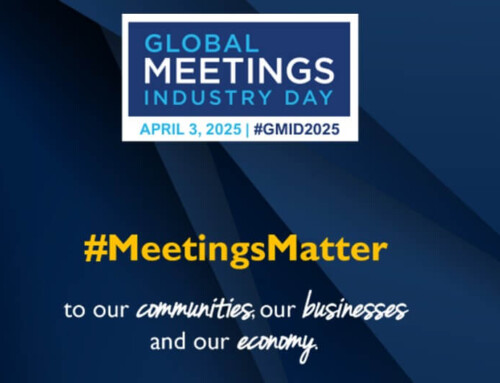This article includes historical information for context. While the core content remains valuable, some details reflect past events and may not be up to date. We regularly update our blog to keep you informed of current insights.
The events industry went through a transformation due to the massive disruption that occurred in 2020. While this introduced new challenges that seemed impossible, it also ushered the industry into an inspiring new era marked by true innovation and creativity.
Rather than cripple in-person meetings, these changes have added a new dimension to them, motivating event planners to go the extra mile to engage attendees. In addition, hybrid meetings combine the best of in-person and virtual meetings to offer something for everyone. That said, onsite meetings are still the most effective type of event. But virtual and hybrid meetings are here to stay in some capacity, so it is wise to understand the elements surrounding them.
Gavel International gathered the most revealing event statistics for 2021 to help companies get an inside look at the current landscape and figure out how to navigate the brave new world of meetings.
Event Budgets Are Expected to Increase
- The majority (72%) of respondents project that B2B marketing budgets will increase. (Event Marketer, 2020)
- 7% of event organizers believe that COVID-19 will impact their event budgets in 2021. (Bizzabo, 2020)
In-Person Events Will Return, Stronger Than Ever
- 80% of virtual event attendees said they are eager to attend live events in person within the next 12 months. (The Drum 2020)
- 62.7% of event marketers are planning to resume holding in-person events in 2021. (Bizzabo, 2020)
- 73% percent of suppliers and 66% of planners said that the approval of effective COVID-19 vaccines had made them more optimistic about what is possible. (PCMA 2020)
- 32% of meeting professionals and 38 percent of suppliers will make presenting proof of vaccination mandatory to attend in-person events. (PCMA 2020)
- Some people attending in-person events can certify their COVID-19 test results using CommonPass to complete the registration process easier (via World Forum.)
- 72% said attending an in-person event was worth all the safety protocols and personal protective equipment, indicating “[we’re] done with virtual events. Bring back live events.” (PCMA 2020)
- Responses underscore that no matter how advanced a technology/platform is, it can’t mimic nor replicate the value of in-person interactions. (PCMA 2020)
In-Person Events Will Become Exclusive
- In-person events will enjoy an increase in status and demand. (CMS Wire 2020)
- In-person events will cater to executives as golden opportunities for networking and one-to-one, in-person meetings. (CMS Wire 2020)
In-Person Events Will Be Smaller, Local and Feature a Virtual Component
- Event organizers reported that 23.6% of their events in 2021 will include a virtual component and will be smaller local events. They will have less than 25 attendees who do not need to travel by air or stay in hotel rooms. (AMEX, 2020)
Security, Safety and Protocols Will Top the Priority List
- 55% of event organizers report that safety presents the biggest obstacle for resuming in-person events. (Event MB, 2020)
- 67% of event organizers said their meetings and events policy contained explicit language around safety and security. (AMEX, 2020)
- Corporate travel bans (through July 2021), and a lack of clearly defined quarantine rules for traveling and returning from travel, are factors that impact decisions when planning events. (PCMA 2020)
- 55% of event organizers report that safety is the biggest obstacle to resuming in-person events. (Event MB, 2020)
- 87% of event marketers said they had canceled events – and 66% have postponed them – due to COVID-19. (Event Marketer, 2020)
Hybrid Events Will Continue to Have a Presence
Half (50.7%) of executives predict that all live events will include a virtual piece from now on. (Marketing Charts, 2020)
- 97% of event marketers believe that hybrid events will be more prevalent in 2021 than previously. (Bizzabo, 2020)
- 4% of event marketers plan to make a hybrid meeting solution that incorporates virtual and in-person events – a crucial part of their 2021 event strategy. (Bizzabo, 2020)
- 79% of companies now expect to host events that include a virtual attendance option. Even in-person events regain their normal precedence. (Martech 2020)
The Complexity of Hybrid Events Will Require Outsourcing
- 35% of virtual and hybrid events require the services of a full-service agency, which, depending on what is needed, may provide presenter training, pre-recorded interviews, virtual studio space and post-event, edited sessions that are available to attendees. (AMEX, 2020)
- (76.5%) of event marketers have never hosted a hybrid event. (Bizzabo, 2020)
- The majority (62.6%) of event marketers work with a production services company to execute their virtual events. (Bizzabo, 2020)
- (52.5%) of event marketers are challenged by virtual events’ logistics and believe that virtual events require a specialized set of skills and resources. (Bizzabo, 2020)
- 32% of event marketers say they have joined an online community to get tech-provider recommendations, citing “there is not a one-stop-shop.” Needs for a 5,000-person event differ from those of a 400-person training program. Lots of selling dreams and servicing nightmares.” [PCMA 2020]
Virtual Events Will Be Short
- Fewer than 7% of event attendees believe virtual events should exceed an hour in duration. (Martech 2020)
- 55% of respondents feel that virtual events should last 30 minutes or less. (Martech 2020)
Virtual Events Will Require a Specific Planning Strategy
- Most planners need between three to six weeks to promote small virtual events successfully. (Markletic 2020)
- 65% of marketers need more than six weeks to promote large virtual conferences and drive the desired number of registrations. (Markletic 2020)
- The average promotional period for C-level virtual events is six weeks. (Markletic 2020)
- 54% of event planners spend more of their time and attention on the attendee experience than logistics. (AMEX 2020)
- 33% of event planners are willing to use additional budgets to invest in enhancing the attendee experience. (AMEX 2020)
Virtual Events Have a Different Purpose
- 96% of event professionals do not believe virtual events will ever replace in-person events. (Bizzabo, 2020)
- 55% of respondents say that customer relations, education and retention are the main goals for the virtual events they execute. (Bizzabo, 2020)
- 7% of marketers say virtual events’ primary goal is to generate sales leads in their pipeline. (Markletic 2020)
- More than half 60% of event professionals changed an event to a virtual format due to the impact of COVID-19 (Bizzabo, 2020)
- 65% of B2B marketers plan to reallocate some or most of their live event budgets to online events such as webinars. (Event Marketer, 2020)
- More than half, 54% of organizations plan to increase the number of webinars they produce. (TOPO, 2020)
- 93% of event marketers intend to invest in virtual events moving forward. (Bizzabo, 2020)
- 90% of event marketers plan to invest resources in virtual meetings permanently. (Bizzabo, 2020)
- 80.2% of event organizers have been able to reach a larger audience with virtual events. (Bizzabo, 2020)
Marketing and Promoting Virtual Events Will Look a Certain Way
- Most companies allocate between 10% to 20% of their marketing budget to virtual events. (Markletic 2020)
- 49% of businesses plan and execute between 20-30 virtual events per year. (Markletic 2020)
- 60% of virtual event organizers use social media to drive registrations. (Markletic 2020)
- 76% of marketers indicate that email is the single most effective way to drive registrations. (Markletic 2020)
- 49% of marketers say that programmatic advertising is a significant contributor to event registrations. (Markletic 2020)
- 51% of B2B companies use their business partner channels to drive registrations. (Markletic 2020)
- 39% of marketers report that their sales teams generate a significant amount of registrations. (Markletic 2020)
- B2B marketers primarily target decision-makers for their virtual events. (Markletic 2020)
- Chatbots have proven an effective way to drive more registrations. (Markletic 2020)
Virtual Events Will Prove Challenging in Some Ways
- 43% of marketers find it challenging to replicate event formats on a virtual model. (Eventsforce)
- 38% of marketers say they run into technical problems when hosting virtual events. (Markletic 2020)
- The biggest annoyance of virtual events is a bad digital connection, with faulty microphones a close second. (Markletic 2020)
- (52.5%) of event marketers are challenged by virtual events’ logistics and believe that virtual events require a different set of skills and resources. (Bizzabo, 2020)
- Only (39.5%) of event organizers consider it easy to find great speakers for virtual events. (Bizzabo, 2020)
- (68.8%) of event marketers feel that it is difficult to provide networking opportunities when hosting a virtual event. (Bizzabo, 2020)
Costs for Virtual Events Will Vary
- Three out of four event marketers (74%) do not charge for virtual event attendance. (Event MB)
- 33.7% of marketers report that the average cost per virtual event attendee is between $500 to $1,000. (Markletic 2020)
- The average cost per attendee for a large virtual conference is slightly higher, at $1,000 to $1,500. (Markletic 2020)
- The average sponsorship package for a virtual event costs $8,456. (Markletic 2020)
- Most of the budget for virtual events is the hosting platform. The second-highest cost is speakers and moderators. (Markletic 2020)
Retaining the Engagement of Virtual Attendees Is Tricky
- More than half (67.7%) of event marketers find it difficult to keep attendees engaged during sessions at virtual events. (Bizzabo, 2020)
- 54% of virtual event registrants convert to virtual attendees. (Bizzabo, 2020)
- The average no-show percentage of virtual events is 35% – which is higher than in-person events. (Markletic 2020)
- Audience engagement is the biggest challenge when it comes to virtual events, with interaction a close second. (Markletic 2020)
- 49% of marketers say that audience engagement is the most significant contributing factor to having a successful event. [Markletic 2020]
- 81.8% of virtual event organizers use event polling to improve interaction. [Markletic 2020]
- 71% of marketers use polling to ensure their audience remains engaged. [Markletic 2020]
- 61% of marketers use videos as an interactive element to improve engagement levels. [Markletic 2020]
- The average virtual attendee watches 68% of a virtual session that is 20 minutes or longer. (Bizzabo, 2020)
- The average number of sessions per virtual event is 12. (Bizzabo, 2020)
- Most (58%) of virtual sessions are smaller, capping at 300 live attendees. (Bizzabo, 2020)
- Only 14% of virtual event sessions present in a larger keynote format. (Bizzabo, 2020)
The ROI of Virtual Events Will Prove Measurable
- A staggering 80% of respondents reported that attendee engagement and satisfaction were KPIs used for measuring the success of virtual events. (Bizzabo, 2020)
- 87% of marketers consider the opportunities generated by virtual events a success factor. (Markletic 2020)
- 71% of event organizers rank deals closed as a success factor. (Markletic 2020)
- Attendee satisfaction is considered a success factor by 85% of marketers. (Markletic 2020)
- 90% of virtual event organizers use surveys to measure attendee satisfaction. (Markletic 2020)
- 64% of event organizers use the feedback received from their sales team to determine attendee satisfaction. (Markletic 2020)
- 78% of businesses that use an event application say it contributes to a positive event ROI. (Markletic 2020)
Data Will Drive Decision-Making About Events
- 74% of event professionals surveyed agreed that data drives their decision-making process. A study concluded that using data to make event decisions will move to the forefront. (Endless Events 2020)
The recent events landscape looks slightly different from the old, but in-person meetings are at the industry’s core. Event planners are already starting to deliver elevated experiences to those who attend in person.
Virtual and hybrid meetings are an excellent complement to onsite meetings. The latter offers the benefit of expanding audiences by providing options for those who cannot attend in person.
Overall, 2021 promises to be a time when the events industry excels and becomes the absolute best version of itself.
Uncertain times call for creative thinking. Contact Gavel International to be inspired with solutions that connect and engage your people.
This article was last updated on April 24, 2025
- Why Hustle Culture Can Harm Sales Success – and How to Repair the Damage - June 30, 2025
- Enhance Sales Through Team-Friendly Storytelling - May 5, 2025
- Unlocking Excellence: The 7 Traits of Top Performers and Their Impact - April 14, 2025






